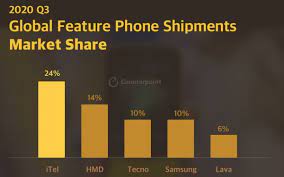1. Diverse Product Portfolio and Market Strategy
Samsung’s diverse product portfolio has played a crucial role in its success. The company offers smartphones across various price ranges, catering to different consumer segments. From flagship devices like the Galaxy S series to more affordable options like the Galaxy A series, Samsung has managed to capture a wide customer base. This strategy has allowed them to tap into emerging markets where price sensitivity is high.
Moreover, Samsung’s strong presence in both developed and developing markets has given them an edge over Apple. While Apple primarily focuses on premium devices, Samsung’s ability to cater to a broader range of consumers has helped them gain a larger market share. By offering smartphones with varying features and price points, Samsung has successfully positioned itself as a brand accessible to all.
2. Technological Advancements and Innovation
Samsung’s commitment to technological advancements and innovation has been another key driver of their success. The company consistently introduces new features and improvements in their smartphones, keeping up with the ever-changing demands of consumers. From cutting-edge camera technology to foldable displays, Samsung has been at the forefront of innovation in the smartphone industry.
One notable example is the introduction of 5G technology in their flagship devices. Samsung was quick to adopt and integrate 5G capabilities into their smartphones, giving them an advantage over Apple, whose 5G-enabled devices were released later. This early adoption of 5G has allowed Samsung to tap into the growing demand for faster and more reliable connectivity.
3. Strong Presence in Emerging Markets
Samsung’s success can also be attributed to its strong presence in emerging markets. While Apple has traditionally focused on developed markets, Samsung has strategically expanded its reach in countries like India, Indonesia, and Brazil. These markets offer immense growth potential due to their large populations and increasing smartphone adoption rates.
By understanding the unique needs and preferences of consumers in these markets, Samsung has been able to tailor their products and marketing strategies accordingly. This localized approach has resonated well with consumers, allowing Samsung to gain a significant market share in these regions. Furthermore, partnerships with local retailers and aggressive pricing strategies have helped them establish a strong foothold in emerging markets.
4. Brand Loyalty and Customer Satisfaction
Samsung’s long-standing presence in the smartphone industry has earned them a loyal customer base. Many consumers have grown accustomed to Samsung’s user-friendly interface, extensive app ecosystem, and reliable performance. This brand loyalty has played a crucial role in driving repeat purchases and recommendations, further solidifying Samsung’s market position.
Additionally, Samsung’s commitment to customer satisfaction has contributed to their success. The company actively listens to customer feedback and incorporates it into their product development process. By continuously improving their devices based on consumer preferences, Samsung has managed to build trust and loyalty among its customers.
Conclusion:
Samsung’s achievement of shipping 235 million smartphones in 2020, surpassing Apple, is a testament to their diverse product portfolio, market strategy, technological advancements, strong presence in emerging markets, brand loyalty, and customer satisfaction. While Apple continues to dominate the premium smartphone segment, Samsung’s ability to cater to a wider range of consumers has given them a competitive edge. As the smartphone market continues to evolve, it will be interesting to see how both companies adapt and innovate to maintain their positions in this highly competitive industry.
